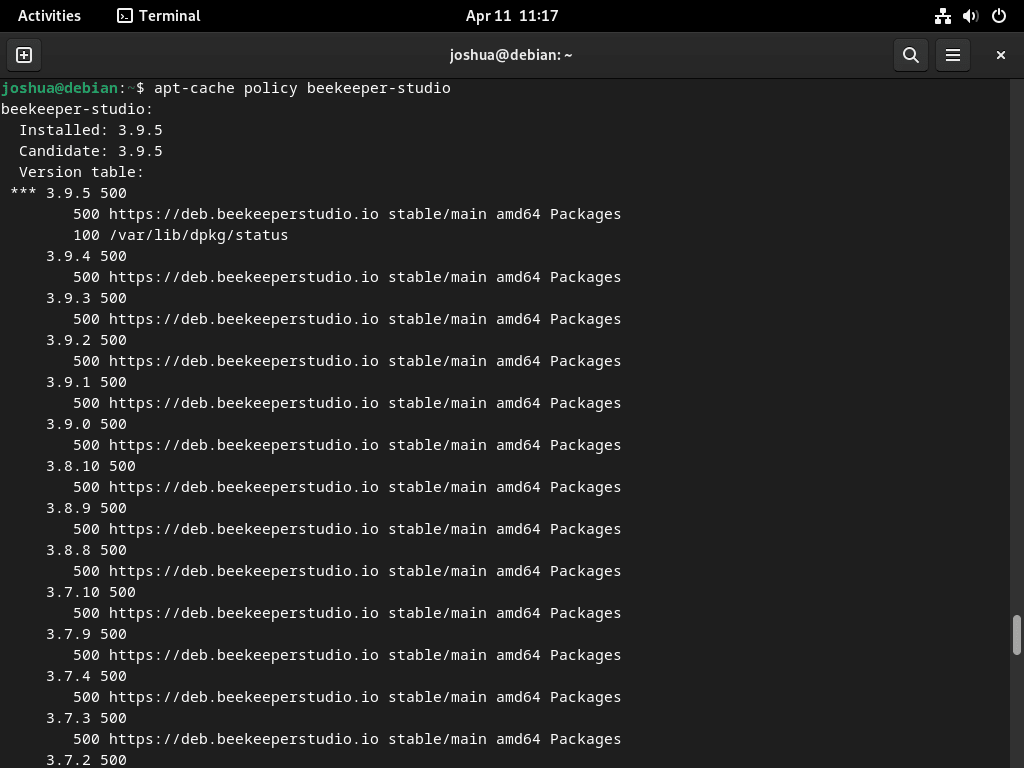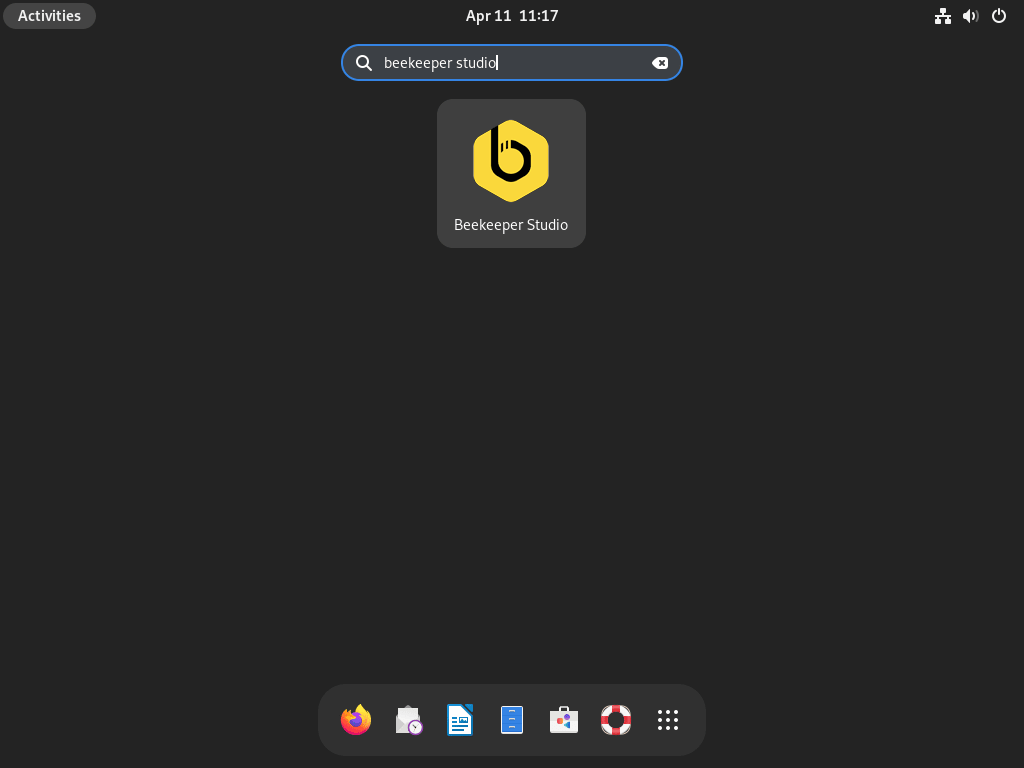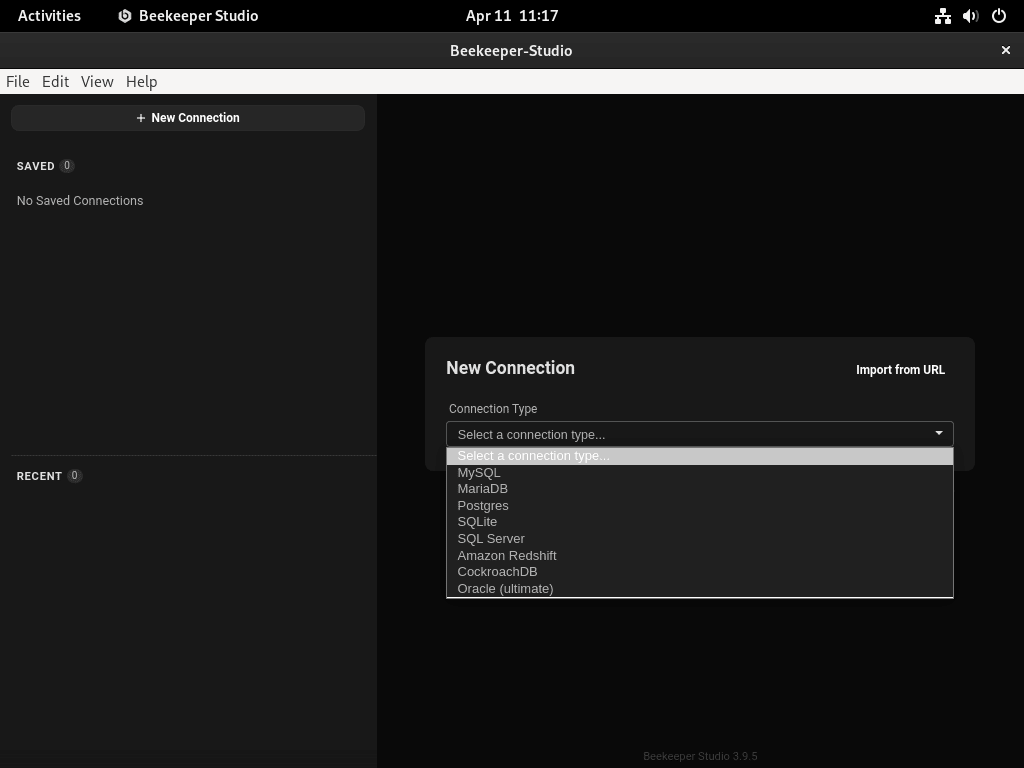Beekeeper Studio is a modern, cross-platform SQL editor and database management tool designed to make database management easy and efficient. It supports multiple databases, including MySQL, PostgreSQL, SQLite, SQL Server, and more. Core features include an intuitive interface, advanced SQL editor capabilities, a data browser, and robust table management tools. Additionally, Beekeeper Studio offers advanced features such as SSH tunneling, SSL support, saved queries, and data export options, making it a comprehensive tool for database developers and administrators.
To install Beekeeper Studio on Debian 12, 11, or 10, you can use the official Beekeeper Studio APT repository mirror, which provides the latest stable build and ensures easy future updates, which we will now discuss in our guide.
Update Debian Before Beekeeper Studio Installation
Before starting the installation process, it’s essential to update your Debian system to ensure that all packages are up-to-date. This guarantees that the system is stable and compatible with the latest software. Run the following command in your terminal:
sudo apt update && sudo apt upgradeInstall Initial Packages For Beekeeper
You will need to install specific software packages to install Beekeeper Studio successfully. These packages include software-properties-common, apt-transport-https, curl, and ca-certificates.
Use the following command in your terminal to install these required packages:
sudo apt install software-properties-common apt-transport-https curl ca-certificates -yImport Beekeeper Studio APT Repository
By default, Beekeeper Studio is not available in Debian’s official repositories. However, you can import the Beekeeper Studio repository to make the application available for installation.
First, import the GPG key using the following command, which ensures that the packages you install are secure and from a trusted source:
curl -fSsl https://deb.beekeeperstudio.io/beekeeper.key | gpg --dearmor | sudo tee /usr/share/keyrings/beekeeper.gpg > /dev/nullNext, add the Beekeeper Studio repository to your system:
echo 'deb [signed-by=/usr/share/keyrings/beekeeper.gpg] https://deb.beekeeperstudio.io stable main' | sudo tee /etc/apt/sources.list.d/beekeeper-studio-app.listUpdate Package Lists After Beekeeper APT Repo Import
Now that you have added the Beekeeper Studio repository update your package lists to include the new repository.
Run the following command in your terminal:
sudo apt updateFinalize Beekeeper Studio Installation via APT Command
With the GPG key and repository securely added to your system, you can install Beekeeper Studio. Use the following terminal command to start the installation process:
sudo apt install beekeeper-studioConfirm Beekeeper Installation
Finally, verify that Beekeeper Studio has been installed successfully. Use the apt-cache policy command to check the installed version and its source. Run the following command in your terminal:
apt-cache policy beekeeper-studio
Launch Beekeeper Studio
Now that you have successfully installed Beekeeper Studio, it’s time to launch the application and begin managing your front-end databases. There are two ways to launch Beekeeper Studio: using the terminal command or through your desktop environment.
First, launch Beekeeper Studio using the terminal, open a new terminal window, and enter the following command:
beekeeper-studioYou can find Beekeeper Studio in your applications menu for users who prefer to launch applications through their desktop environment. Follow these steps:
- Open the “Activities” menu, typically in the top-left corner of your screen.
- Click on “Show Applications” or an equivalent option, depending on your desktop environment.
- Search for “Beekeeper Studio” using the search bar or browsing the installed application list.
- Click on the “Beekeeper Studio” icon to launch the application.


Additional Beekeeper Studio Commands
This section will cover some useful commands and tips for managing Beekeeper Studio on your Debian Linux system, including updating and uninstalling the application.
Update Beekeeper Studio
Beekeeper Studio may receive updates that include new features, bug fixes, and improvements. To keep your installation up-to-date, use the standard apt update and upgrade commands. This will update Beekeeper Studio along with other system packages:
sudo apt update && sudo apt upgradeRemove Beekeeper Studio
If you no longer need Beekeeper Studio on your system, you can remove it using the following commands.
First, uninstall the Beekeeper Studio package:
sudo apt remove beekeeper-studioNext, delete the GPG key to remove trust from the Beekeeper Studio repository:
sudo rm /usr/share/keyrings/beekeeper.gpgFinally, remove the Beekeeper Studio repository from your system:
sudo rm /etc/apt/sources.list.d/beekeeper.listConclusion
With Beekeeper Studio successfully installed on your Debian system, you can take advantage of its powerful features for efficient database management. The official Beekeeper Studio APT repository ensures you stay up-to-date with the latest stable builds and updates. Enjoy the balance of user-friendliness and advanced functionality that Beekeeper Studio offers, making it a preferred choice for database developers and administrators.

